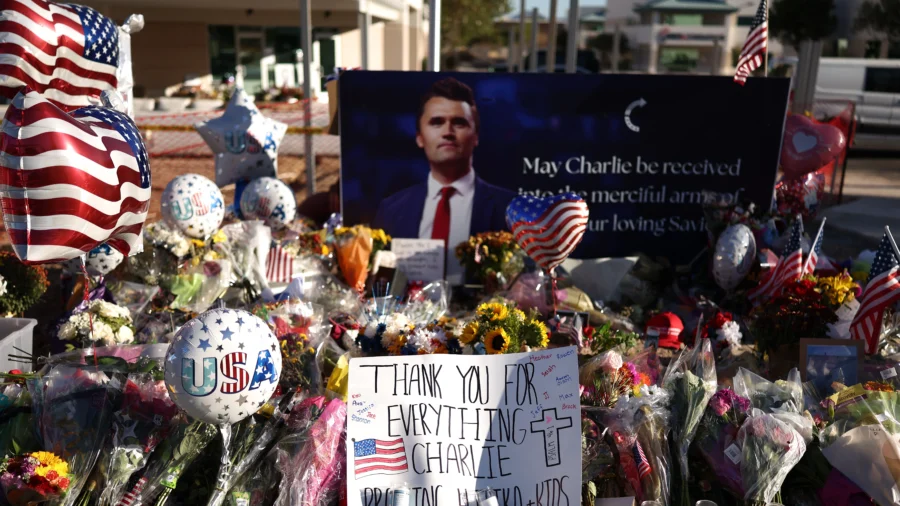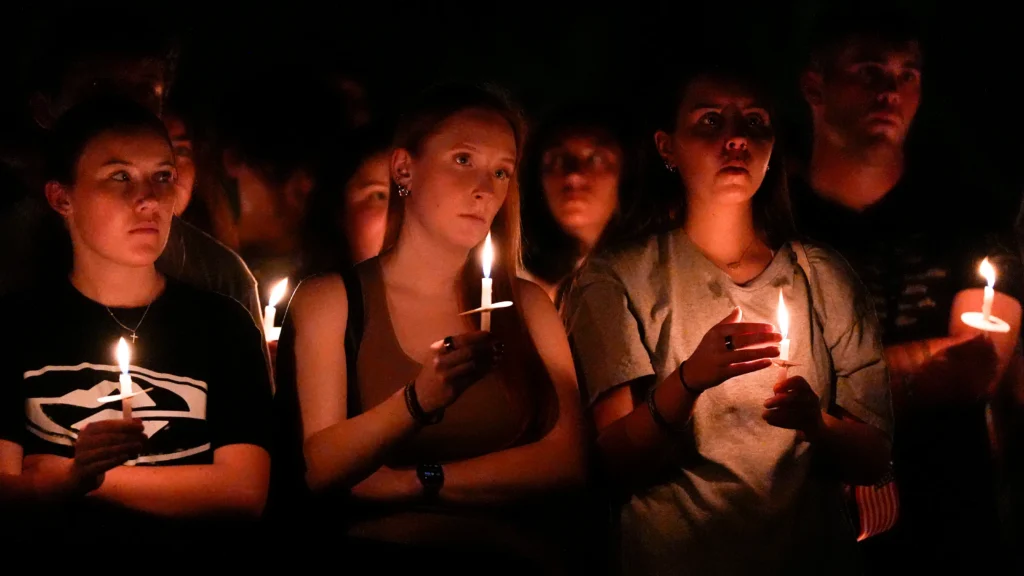For me, deciding to attend the vigil was not simple. Kirk had been a figure whose rhetoric often cut deep and whose style felt combative. His words rarely left room for the kind of dialogue that builds understanding or bridges divides. More often than not, his approach seemed to fuel polarization rather than ease it. Because of this, I hesitated. I wondered if attending might be seen as endorsing his message, or if I would feel out of place in a space so closely tied to a worldview I had spent questioning and, at times, opposing. Yet, in the face of his sudden death, there was a sense that this was no longer about politics. It was about acknowledging grief, loss, and the undeniable impact he had on others.
Walking into the vigil, the first thing that stood out was the presence of security. Officers stood at key points, their posture careful and alert. The atmosphere was tense, shaped by the gravity of recent events and the possibility of protest or confrontation. But beyond that layer of caution, what surprised many was the sheer size of the crowd. Close to 500 people filled the space, a mix of students, community members, alumni, and even local leaders who had traveled to be there. The air carried both sorrow and solidarity, a reminder that Kirk’s reach extended far beyond headlines and social media posts.

The program itself included speeches from politicians, local leaders, and conservative students who shared how Kirk had shaped their outlook on politics, religion, and community. Their words were deeply personal, filled with anecdotes of how his presence, podcasts, and speeches had guided them in moments of uncertainty. For those who disagreed with him, it was striking to see just how deeply his ideas had resonated. His influence was not abstract. It was woven into the identities, ambitions, and beliefs of the people standing shoulder to shoulder in the room. To dismiss that would have been easy. To witness it, however, demanded empathy—the kind that can only come from being physically present in a space where loss is palpable.
Attending the vigil did not mean endorsing Kirk’s message. To me, it was instead about recognizing the humanity of those grieving. It meant choosing presence over absence, listening instead of dismissing, and respecting the significance of what Kirk represented to others. Even in discomfort, there was value in bearing witness to the pain and admiration expressed by peers and neighbors. For a few hours, political boundaries softened, and what took center stage was not ideology, but the raw, universal experience of loss.
The vigil displayed a hard but important lesson: empathy does not erase disagreement. It does not ask anyone to abandon convictions or minimize the harm words may have caused in the past. But it does call for a willingness to see people in their fullness—not just as political opponents, but as human beings with real attachments, real grief, and real hopes. To stand among hundreds of mourners was to realize that every community contains multitudes, and every figure, however polarizing, can leave behind a legacy of meaning to those who followed them.
As BridgeUSA students across the country know, dialogue isn’t always about words. Sometimes it is about showing up, even when it feels difficult, and acknowledging the humanity of those on the other side of deep divides. That night at the vigil modeled that. It reminded me that dialogue is not confined to structured debates, roundtables, or forums. Dialogue is also lived out in the quiet decision to enter a room you are unsure about, to stand alongside people with whom you disagree, and to recognize the weight of their loss without needing to erase your differences.

Though it lasted only a few hours, the vigil carried lessons far beyond its candles and speeches. It was a reminder that community is not built only when it is easy, and respect is not earned only by those we agree with. Compassion is most meaningful when it stretches across the lines that divide us. True dialogue asks us to stay rooted in our beliefs while extending grace toward others who do the same. That is not a weakness but a strength—a strength that builds trust and possibility in a world too often fractured by mistrust.
In the end, the vigil revealed something profound. Community is tested most in difficult moments, and respect carries weight even when directed toward those we disagree with. The lesson endures that empathy matters most when it feels unnatural. As BridgeUSA chapters press forward this fall, that reminder should guide us. The work of dialogue is not just about discussion, but about showing up with humanity, especially when it’s hard. That is when the true test of our commitment to bridge-building takes place.

